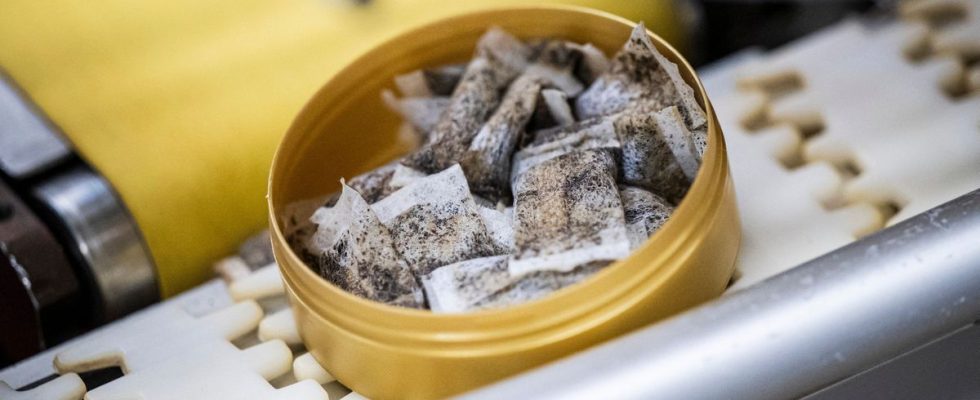Published on
Updated
Reading 4 min.
In its battle to become the first European country without smokers, Sweden gives pride of place to snus, a sachet of tobacco or nicotine to suck, but experts are worried about a “fairy tale” sold by tobacco companies.
Sweden is banking on snus against cigarettes. A fool’s game?
Consumed by one in seven inhabitants, snus has contributed, according to the Swedish government, to reducing the number of smokers from 15% to 5% in less than 20 years, a record in Europe.
Banned in the rest of the European Union since 1992, the product in its traditional version benefits from an exemption in the country.
At a frantic pace, thousands of doses of snus travel through a clever network of machines at the “Swedish Match” factory in Gothenburg, in western Sweden. The company, a major player in the sector with around twenty brands, sold 277 million boxes in Scandinavia in 2021.
“Snus has 200 years of history, it is part of Swedish culture, just like wine elsewhere“, assures Patrik Hildingsson, responsible for communications.
In a white coat, he details the manufacturing steps: “tobacco comes from the United States and India. It goes through a silo, is packaged in these bags like tea, then put in a can“.
Two types of products exist: classic brown snus which contains tobacco and white snus which is composed of synthesized and often flavored nicotine.
Young people won over by snus
Sweden is the only EU country where classic snus is authorized for marketing. With Norway and more recently the United States, these three countries constitute the bulk of the market.
White snus, the industrial production of which dates back around fifteen years, benefits from a legal loophole in the EU because it does not contain tobacco. It has only been banned in Europe by Belgium and the Netherlands since 2023.
This product is enjoying record success among young people. In Sweden, consumption of white snus jumped from 3% to 12% in four years among women aged 16 to 29.
If the daily consumption of snus is 15% in the country, a figure which has increased slightly in recent years, Sweden is at the same time experiencing a significant drop in the number of smokers. According to 2022 statistics from the Public Health Authority, there are now only 5% of regular smokers. An objective that the EU only sets for 2050.
“It’s very positive“, welcomes Swedish Minister of Health Jakob Forssmed in an interview with AFP.
“There was a law in 2005 banning smoking in restaurants, then in 2019 on terraces and certain outdoor spaces (..) Many Swedes also say that switching to snus helped them stop smoking“.
A sign of support for the sector, the Swedish state has just increased taxes on cigarettes by 9% and reduced those on traditional snus by 20%.
“With all these new regulations it has become almost impossible to smoke. And then with snus, there is no smell. And the nicotine rush is much stronger!“, says Thorbjörn Thoors, a 67-year-old window renovator, who has been using snus since he was a teenager and has stopped smoking.
An increased risk of cancer?
The government’s decision to lower the tax on snus made Ulrika Årehed Kågström, secretary general of the Swedish Cancer Foundation, jump.
“It was a surprise and a real disappointment. This shows that the government completely believes in the tobacco industry’s fairy tale that presents snus as a harm-reducing product.“, she says. “We lack scientific studies“, she insists, “we know that snus and other products that contain nicotine change blood pressure, and that there are risks of cardiovascular diseases“.
The specialist fears that “we are not making the same mistakes as decades ago when we had to wait a long time to have studies on the dangers of cigarettes“.
Last January, the national committee against smoking (CNCT) warned of the dangers of these products and in particular their nicotine dosage. “These nicotine sachets deliver a very large dose of nicotine: up to 20 mg according to certain brands of nicotine sachets compared to 1 to 3 mg for a classic cigarette. This characteristic means a very rapid onset of dependence, especially among young people who are the main target of marketing this product through the many flavors available.“.
Published in June 2023, a survey carried out by the Norwegian Institute of Public Health indicates that among regular consumers of snus, the risks of esophageal cancer and pancreatic cancer are respectively three times and two times higher than among regular consumers. individuals who do not consume nicotine. An independent German study noted the presence of nitrosamines specific to tobacco, some of which are carcinogenic (NNN, NNK) in a large proportion of the nicotine sachets tested.
In 2017, a study published in the International Journal of Cancer which included data from more than 400,000 patients using snus concluded that there was no link between cancer and the substance.
It is urgent to legislate according to the associations
The anti-tobacco alliance calls on the government to react quickly to legislate against this scourge. On BFM, Loïc Josseran, doctor, President of the ACT-Alliance Against Tobacco declares: “Every month, every quarter lost, young people become dependent. It takes political courage to put industrialists out of the game“.
In a press release dated November 15, the CNCT recommends, for widely distributed products, such as electronic cigarettes, whether or not they contain nicotine, to regulate them based on the provisions currently in force for products of the tobacco with in particular neutral packages for these products, the ban on flavors with the exception of tobacco flavor and, the complete ban on advertising on all media including the removal of product stalls or “display ban.”
For new products (snus and nicotine pearls and for future products containing nicotine, whether smoked or for oral use), the CNCT recommends banning them outright, following the example of Belgium.
